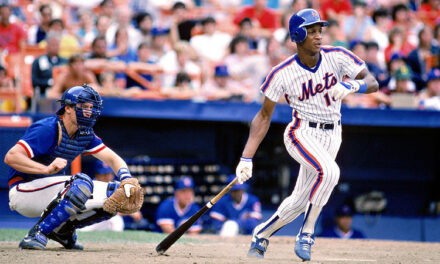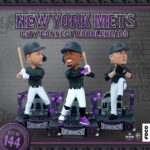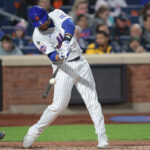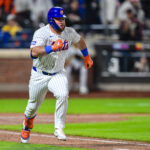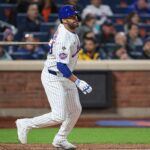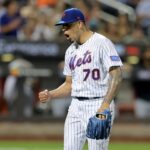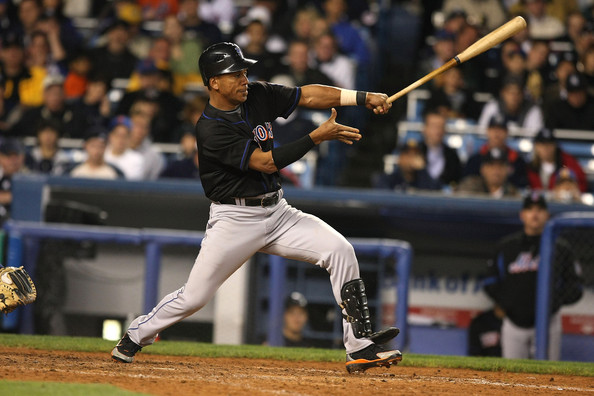
Throughout his 17-year major league career, Moises Alou was one of the most dangerous hitters at the plate.
A six-time All-Star with five different teams, Alou posted a career slash of .303/.369/.516 with 2,134 hits and 332 home runs. He twice finished in the top-3 of M.V.P. voting (1994, 98), and took home Silver Slugger Awards in those same seasons.
Alou, 53, is one of nineteen players in major league history to collect at least 2,100 hits, 325 homers and record a career batting average of .300 or better. His offensive prowess was well-established, though, for Alou, his biggest issue was remaining healthy and staying on the field.
For his career, Alou appeared in 140 or more games just five times. He missed the entire 1991 season due to a serious shoulder injury, and then the entire 1999 campaign after his tore his ACL when he slipped and fell off his treadmill at home in the Dominican Republic.
In total, Alou underwent nine surgeries in his career, yet remained a steadfast presence at the plate once he returned from injury.
Take the 2007 season for example, which was his first year playing for the New York Mets after signing a one-year deal (with a team option) in November 2006. Alou was placed on the disabled list in May due to a quadriceps injury. At the time of the injury, Alou was slashing .318/.374/.445 with as many walks as strikeouts (11) and 10 extra-base hits in 30 games in his age-40 season.
As soon as he returned to the Mets’ lineup in late July, Alou went right back to work at the plate.
While the Mets’ season collapsed down the stretch, Alou’s offensive production was off the charts. After returning from the DL, Alou appeared in 57 games, slashing .353/.401/.564 with 11 homers and 36 RBIs. His 149 wRC+ was in a 3-way tie for 8th-best among qualified National League hitters in the second half of the 2007 season.
During that period, Alou established a new club record for longest hitting streak at 30 games (August 23 to September 26), breaking David Wright’s previous club record of 26 games in 2006.
Alou finished the ’07 season with a .341 batting average. Since 1900, only three players that were 40 or older (age on June 30th) recorded a season in which they hit .340 or better with a minimum 300 at-bats: Ty Cobb (.357, 1927), Sam Rice (.349, 1930) and Alou (.341, 2007).
The son of Felipe Alou, a three-time All-Star in his own right and the first Dominican-born manager in the majors (who managed the Montreal Expos and San Francisco Giants for a total of 14 seasons), Moises has had several offers to interview for major league manager openings, potentially following in his father’s footsteps.
However, Alou is adamant about not returning to the game as a manager. Just this past offseason, Alou was approached by the San Diego Padres, where he’s worked as a special assistant in player development since 2015, about interviewing for the vacant managerial position. He declined and took his name out of the running before the Padres eventually hired Jayce Tingler.
While Alou has no intention of managing, that doesn’t mean he won’t be paying great attention to one current big league manager who he shares a great bond with. Alou’s brother, Luis Rojas, was named the 23rd manager in Mets history in late January, after managing for many seasons in the team’s minor league system and serving as their quality control coach in 2019.
Alou’s content in remaining his role with the Padres and spending quality time at home in the Dominican Republic.
The right-handed-hitting slugger, whose stance at the plate was so quiet, yet was blessed with such quick wrists that would send baseballs scorching into the gaps or over the outfield walls, will forever be revered for what he added to his family’s legacy.
And now he gets to watch from afar as his brother embarks on his own big league career and looks to add even more prestige to one of the game’s great families.
I had the pleasure of speaking with Alou in mid-May where we discussed his family’s legacy, his time with the Mets and thoughts on how his brother will fare managing in Queens.
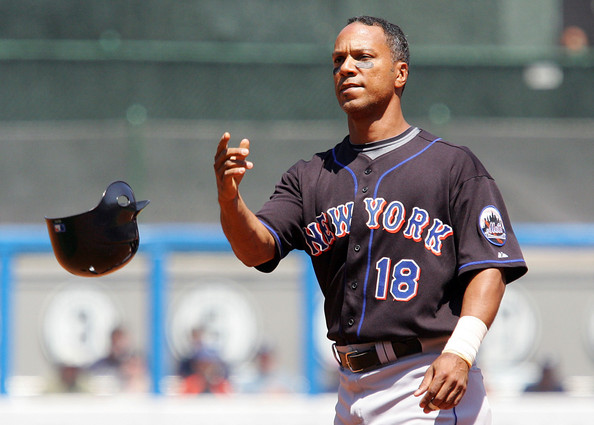
MMO: Who were some of your favorite players growing up?
Alou: My favorite player growing up was Pedro Guerrero. I grew up in the Dominican Republic and I grew up a fan of Guerrero’s.
MMO: I read that you initially played basketball over baseball growing up. Is that true? And at what point did baseball become your predominant sport?
Alou: Actually, I had no choice but to play basketball because the schools here in the Dominican didn’t have baseball programs or baseball fields. But they do have basketball like every school and they have basketball courts.
I started playing organized baseball right after high school because I wanted to get a scholarship to go to school in the United States, and that was my only way out. My brother had a scholarship from this Latin American foundation.
I played some baseball – street ball or pickup games – and I’d play some with my uncle. But I didn’t play organized until after high school.
MMO: It’s amazing to think that you didn’t play organized baseball until college and still became such a feared hitter in the league for 17 years!
Alou: Yeah, I went from graduating high school in the summer of ’84, started playing organized baseball to being a first-round pick in the January Draft of 1986.
MMO: Your family is considered baseball royalty when you talk about your father Felipe; uncles Jesús Alou and Matty Alou; your cousin Mel Rojas; and now your brother, Luis Rojas, managing the Mets. How do you reflect on your family’s importance in the game?
Alou: We’ve been blessed. I dislike using the word “royalty,” but when people hear the name Alou in the Dominican because it’s not a common last name, it relates to baseball.
I think it’s pretty impressive the fact that my dad and his two brothers played on the same team and in the same game. It’s pretty awesome!
I had a pretty good career and then my dad was a pretty good big-league player and a pretty good manager. Now my younger brother is a big-league manager, even though he hasn’t made his big league debut yet. So, we’ve been blessed as a family.
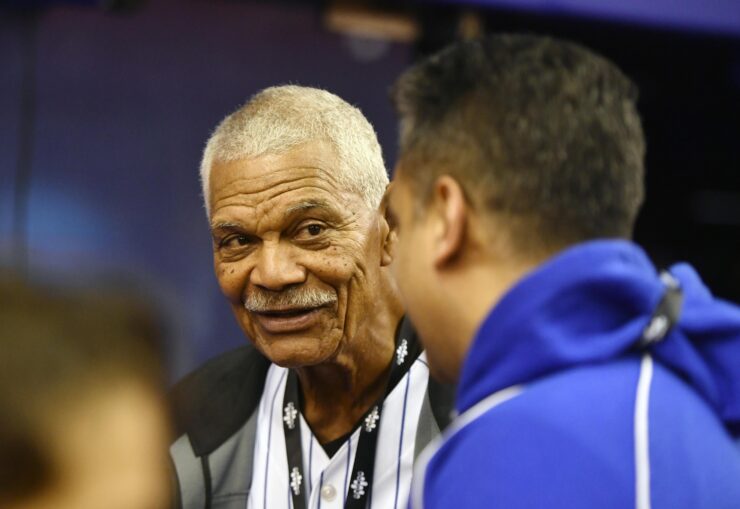
MMO: How would you describe your dad as a manager?
Alou: I played for seventeen seasons and played for different managers and I always say that my dad was the best manager I had. Not because he’s my father, but there’s something about him that made him so much better than the other guys that I had. And I played for Jim Leyland, Dusty Baker; I played for some good managers.
My dad is a pretty knowledgeable guy and if you played for my dad you’d learn something. Whether it’s baseball, life, fishing, or religion, he’s a pretty smart guy.
MMO: When you think back to the 1994 Montreal Expos, in which the club had the best record in the game (74-40) and you were having one of your finest all-around seasons, do you think the Expos would’ve been World Series champs had there not been a players’ strike?
Alou: It’s pretty hard to predict. Baseball’s not like boxing where you can say I’m going to win the title; in baseball, you can’t say that.
We had a stacked team and the time that it happened we were just getting better. We were a bunch of young guys and starting four years before in 1990 when I got to the Expos after the trade, Larry Walker was there, Delino DeShields was there, Marquis Grissom was there, Mel Rojas was there.
And then year-after-year we kept adding guys and lost some guys but kept getting better and better. We got Pedro Martinez for Delino. We were young and it was pretty much like we grew up together even though some of us came from other clubs like John Wetteland from the Dodgers, Sean Berry came from Kansas City, Wil Cordero came from within the organization.
It was pretty much like we grew up together and we had chemistry, man. I’ve been on so many good teams, but this is the only team I remember where we’d go to a visiting park, stretch somewhere before the game and you could feel the other team was afraid of us. Like, they were ready to get their ass kicked, that’s how good that team was.
Whether we would’ve won the World Series, I don’t know. But we were getting better at the time of the strike. We had a six or seven-game lead against the Braves who had a dynasty in the East. It was probably going to be a 15-game lead at the end of the season and playing against some very good teams.
MMO: You had a terrific World Series in 1997, with 3 homers, 9 RBIs and an OPS of 1.101. What memories stand out to you from that Series? And was there anything you changed or altered at the plate compared to the 1997 NLDS and NLCS?
Alou: It’s just a matter of getting hot at the right time. As a team with the Marlins, that’s what happened: We got hot. As a player, when you have a good team, every day is a different guy. Every series is a different guy.
I had a slow ’97 playoffs, but I remember I had a game-winning hit against the Giants in the Divisional Series in ’97 (Game 2 off Roberto Hernandez). My average didn’t show it, but I contributed big time in one of those wins for us to go to the next round.
During the World Series, I just got hot. They couldn’t hold me for that long! I remember before the first game of the ’97 World Series, Jerry Manuel was one of our coaches, and I was shagging in the outfield and he came walking through the outfield and was tracking to me. We came together from the Expos; he came as a coach and I came as a player and we had a great relationship, we still do.
I remember Jerry saying to me, “Hey man, you’re going to get hot. You’ve got to get hot!”
He kind of pumped me up. And I went deep in my second at-bat in the World Series and that pretty much broke the ice. Second at-bat you hit a homer and then all of a sudden it’s a little easier for you.
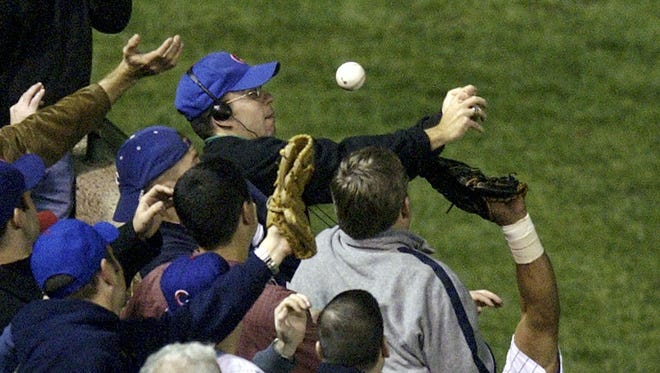
MMO: Does a day go by where the name Steve Bartman isn’t brought up to you?
Alou: Well, not really. [Laughs.] Now, yes, because in the Dominican we have a curfew here due to the pandemic, and I don’t go anywhere unless I have to. But besides that, no, one day doesn’t go by where somebody doesn’t ask me a question about Bartman.
MMO: Is there any doubt in your mind that you would’ve caught that ball?
Alou: There’s no doubt in my mind that I would’ve caught the ball. That was probably the reason why I was so upset about it and also the situation as well. We kept coming back and we had them on the ropes as they say. We were up three games to one, then three-two, and they tied the series.
I’m 100 percent certain that I had that ball because I was pretty bad making that play in foul territory or trying to rob a homer because I always used to take my eyes off of the ball. That time, I remember I had my eyes on the ball. I knew I had that ball.
MMO: Fast forward to November 2006, when you signed a one-year deal (with a team option) with the Mets. What made you sign with New York, and how was your experience overall playing in the Big Apple?
Alou: I remember it was kind of like when I signed with the Marlins in ’97. I wanted to play for the Mets so badly. Why? I don’t know. Probably because we were going to have a good team when I was going to play in New York.
Omar Minaya was the GM and he’s from the Dominican and I wanted to be part of that team. I remember kind of doing my own negotiations when they called. I’m going to tell you something that I never told anyone: I had a two-year deal with the Indians. Guaranteed two years for more money than what I signed for with the Mets. I signed with the Mets for less money and only one year guaranteed and a team option. So, I left money and another year guaranteed on the table to go to New York.
There was a couple of reasons for that. One, I wanted to stay in the National League. And two, one of my teammates with the Giants, the team I played on before the Mets, was Omar Vizquel. I remember calling Omar and telling him I have to make a decision: two years with the Indians or one year with the Mets. And Omar told me, “Cleveland is such a nice city, but I would go to New York, it’s best.”
That was part, not the whole reason, but that was part of the reason why I went to play with the Mets.
I had a great time, I was always thankful for the way that I was treated by the Wilpons and Omar. They have a very special place in my heart. I was treated very nice, they were very down-to-earth owners when I played there.
I remember after I played my last game after I got hurt and I was going to be out for the year, Fred invited me over to his house for dinner. He felt bad about the way my season ended. And that’s something that I’ll always remember.
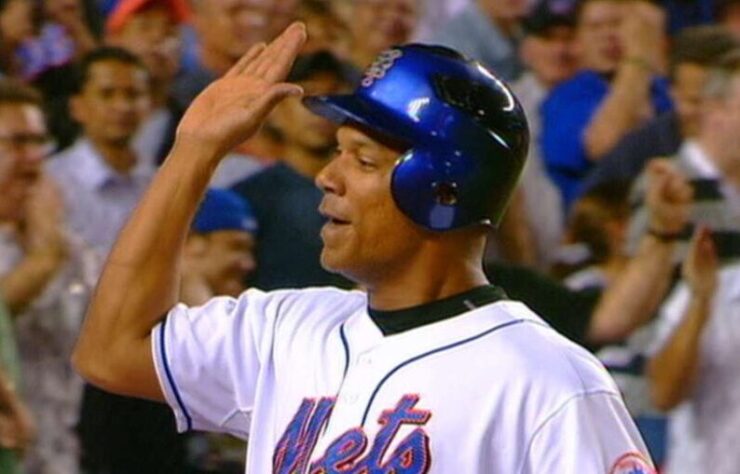
MMO: During your 30-game hitting streak in 2007, was that as locked in as you can remember being at the plate during your career?
Alou: I remember being locked in. But the thing that I’m most proud about with that 30-game hitting streak is the period of time when it happened. We were in the pennant race and to be hot and getting hits every day during that race is something that I’ll always be proud of.
I was a guy that moved everywhere. I wasn’t a bad teammate and I wasn’t a bad player; pretty much when you move around it’s because you’re a bad guy or a bad player. I wasn’t either one of those. I don’t know, nobody ever signed me back. I would sign with a team for two years and after that season I would move to another team. It happened a couple of times.
With the Astros, I had an option to become a free agent after ’98 because I got traded during a long-term deal with the Marlins. I could’ve left Houston, but they asked me to stay so I stayed. And then the Mets asked me back after they picked up my option.
Everywhere I went I wanted to do good for that team. I wanted to do good for the guy that traded for me, I wanted to do good for those who signed me as a free agent. I’m a six-time All-Star, and I’m an All-Star with five different teams. So everywhere I went, I made the All-Star team. That meant I had a good season with every club that I went to.
When I signed with the Mets, I was very disappointed because I remember I pulled my hamstring around May which made me miss two months. One thing that I wanted was to make the All-Star team as a Met. And I probably would’ve done it! When I got hurt I was playing well, and then I missed two months. Then I came back and had the 30-game hitting streak, so that’s something I’m proud of.
That was my biggest disappointment, that I played well but I couldn’t stay on the field.
MMO: One of the many things you’re remembered for in your career is forgoing using batting gloves. Was that something you did your whole career and what was the reason behind it?
Alou: I liked feeling the wood of the bat. It would sting my hands, but I felt like I hit the ball harder without batting gloves. I never used batting gloves. I don’t know, maybe in the minor leagues I did or in junior college. But in my big-league career sometimes maybe I would if I was slumping and looking for luck, but my whole career playing every day I didn’t use batting gloves. You might find a picture or baseball card for some reason; maybe I had a blister or something.
But I believe in my seventeen seasons I didn’t use batting gloves. I just liked the feel of the wood in my hands.
MMO: I had a tweet about players 40 or older who hit at least .340 with a minimum of 300 at-bats. You were one of the three since 1900, along with Sam Rice and Ty Cobb. Many remember you for your tremendous hit tool and quick wrists. How were you able to continue hitting at such an elite level so late in your career?
Alou: The way I hit, my swing and everything was low maintenance. I didn’t have very much movement because I had quick hands. My bat speed was pretty good and I remember my dad telling me, and I agreed with it, that the guy that can hit the fastball is going to stay in the game as long as they want.
I could’ve stayed in the game if I didn’t get hurt. Even after I got hurt, I could’ve signed with the Phillies in 2009. I didn’t want to play anymore because I was tired of getting hurt. So, I would’ve played at age 43 if I wanted to. My last four seasons I hit over .300 and seven out of my last ten I hit over .300.
I became a better hitter. I didn’t hit .300 in Chicago because it’s tough to hit .300 in Chicago because of the big grass. I was a guy that was a line-drive hitter, that found holes. My skills were getting better and better as I was getting older. And when you have nine surgeries in your career it takes a toll.
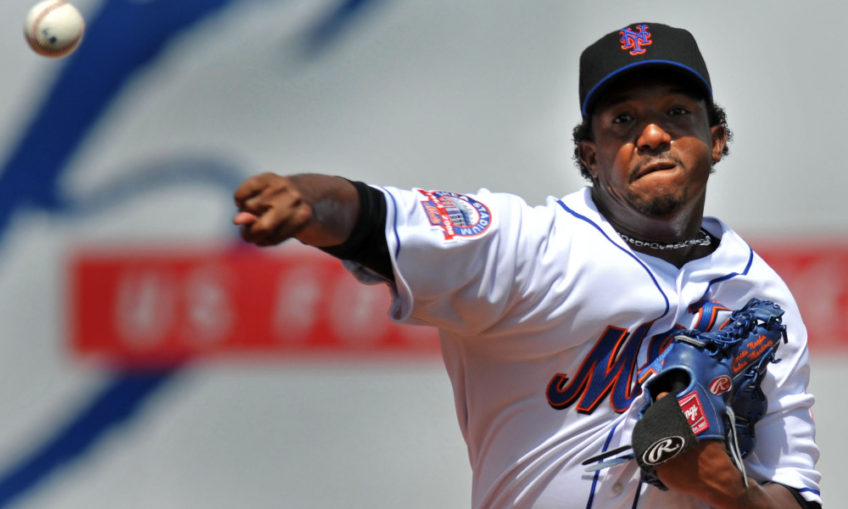
MMO: Who was the toughest pitcher you faced during your career?
Alou: By far it’s Pedro. I played with Pedro for three or four years, and I only had like 10 at-bats off Pedro.
José Rijo was also tough, John Smoltz was tough. But Pedro definitely number one for sure.
MMO: Your brother, Luis Rojas, is embarking on his first major league managerial job with the Mets. Can you talk a bit about why Mets fans should be excited for Luis at the helm?
Alou: Luis is a seasoned manager. This guy is like a young veteran manager. He comes with a seasoned resume with more experience than a lot of the managers already in the big leagues. He doesn’t come with a big-league career, but he does come with a pedigree. He’s the son of a very good manager, the best manager I ever played for. He’s a kid with a lot of passion for the game, he loves the game and someone that has a lot of experience as a manager in the minor leagues and as a winter league manager.
Winter league is a step that a lot of managers want to take. A lot of people don’t want to manage in the big leagues, but they want to come manage in the winter leagues.
David Bell with the Reds, he came here and managed my team when I was GM [Leones del Escogido]. He came in and managed the team that Luis managed for three or four years.
Luis won a championship here, he won one in the minor leagues. If you give him a good team despite his young age, he has a lot of experience and he has great leadership. That’s something I’m very proud of and I think he’s going to push the right buttons most of the time.
MMO: I’ve often heard that managing in winter ball is a terrific way to gain valuable experience based on the serious competition.
Alou: It’s the competition and pressure. When you manage in the Dominican there are 5,000 managers; everybody here thinks they can manage and that they’re smarter than the manager. It’s basically what have you done for me today. If you lose tomorrow, they want you fired. They fire managers here after four games! Seriously, after four games they fire managers in winter ball.
When they ask me about Luis and if managing in New York is going to bring him pressure, I tell them he’s been through worse pressure here in the Dominican. [Laughs.]
MMO: Your name has popped over the last several years as a potential managerial candidate. Can you envision yourself ever managing in the major leagues?
Alou: No, no chance. My name has come up and I’ve been asked for interviews, but no.
MMO: You’ve been working in the Padres’ front office as a special assistant in player development since 2015. Are you still working in that capacity with the Padres and what are some of your responsibilities?
Alou: Yes, I’m still a special assistant with the Padres. I kind of do a little bit of everything and a little bit of nothing. [Laughs.]
I do some scouting and a special assistant’s job is kind of like an advisor. I’m involved with a little bit of everything like when we interview managers and coaches. The only thing I don’t get involved in is the draft and things like that. But they’ll ask my opinion for free-agent signings and trades.
MMO: Looking back on your career, what are you most proud of?
Alou: You know what I’m most proud of? I work with the Padres now, and whenever we sign a player or trade for a player, I always like to sign or trade for a guy that shows up every day. That’s what I’m most proud of: that I showed up every day.
I showed up every day and I was there to give it all I had. Like I said earlier, the Mets signed me, I wanted to be an All-Star. That’s the thing I’m most proud of, that I showed up every day.
MMO: Thank you very much for your time today, Moises. It was great to talk with you about your incredible career.
Alou: Thanks, Mat.
Follow Moises Alou on Twitter, @MoisesAlou18





